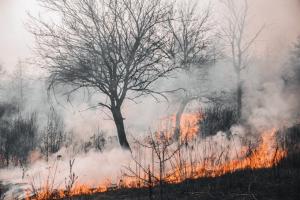Climate change is progressing faster than trees can adapt. Challenges and uncertainties to the state of the world’s forests and their future are growing.
This summer, Europe saw record-breaking temperatures and a series of heatwaves that intensified drought conditions. With more than 760 thousand hectares of land burned so far across European Union countries, 2022 has been a record year. Not only forests were burnt to the ground, but crops were also destroyed and infrastructure was damaged, not to mention the impact on human’s lives.
Natural disasters, diseases and pests of the past have shown the vulnerability of forests in the UNECE region. According to the latest reporting cycle of the Food and Agriculture Organization of the United Nations Global Forest Resources Assessment (FAO FRA), in 2015, 33 million ha of forests in the UNECE region were damaged by insects, diseases, and severe weather events. An additional 11 million ha of forests were affected by forest fires.
When forests and their ecosystems are disturbed, our lives and livelihoods are disturbed or even lost, infrastructure is damaged and the environment heavily impacted. Climate change further exacerbates these risks.
Forests were meant to be the beating heart in our strategies to adapt and to mitigate climate change. Given the latest forest fire season in the countries of the United Nations Economic Commission for Europe (UNECE) region, these expectations can be challenged, and forests can turn into victims of rather than solutions for the increasing effects of climate change.
Therefore, monitoring, assessing and reporting forest damages and disturbance is a key pre-requisite to maintain forest health and vitality. Such sound research and statistical evidence are cornerstones of both reliable decision making and profound policy and management responses to increase forest resilience. Despite past efforts, the monitoring of forest damage and disturbance in the UNECE region, their assessment and reporting show deficits. These include, in particular, the inconsistent reporting on data analysis and the large variety of national approaches and data collection systems which make country-to-country comparison a challenge.
The scientific-technical symposium on “Assessing forest damage/disturbance in the UNECE region” organized by the UNECE, the FAO and the Austrian Federal Ministry of Agriculture, Forestry, Regions and Water Management in Vienna, Austria, on 29-30 September 2022, therefore focused on the potential for further refinement of national as well as international reporting and assessment on forest damage/disturbance.
National and international forest policymakers and experts agreed on the need to tackle the underlying reasons for the current fragmented national data availability, timeliness, evaluation, and interpretation of information. It was also emphasized that digital, cost-effective monitoring tools and techniques such as cloud computing and machine learning could enhance the consistent monitoring, assessing, and reporting forest damage/disturbance. Such innovative approaches combined with traditional inventories can, over time, produce highly accurate forest damage/disturbance data. This, in turn not only ensures effective management responses and prevention strategies but might also be the most effective way to achieve data harmonization in the UNECE region for the well-being of our forest ecosystems.
Background
The joint UNECE/FAO Forestry and Timber Section supports developing evidence-based policies for sustainable forest management and communicates knowledge about the many products and ecosystem services provided to society while assisting countries of the region to monitor and manage forests.
The Vienna symposium provides a platform for sharing the preliminary results of a related project, which was initiated by the UNECE/FAO Team of Specialists on Monitoring Sustainable Forest Management in 2020. The project is implemented by the Joint UNECE/FAO Forestry and Timber Section with the support of Austria, Canada, Finland, Germany and the United States.
More information about the symposium can be found here.
To learn more about UNECE/FAO’s work on Forest Assessment, click here.


